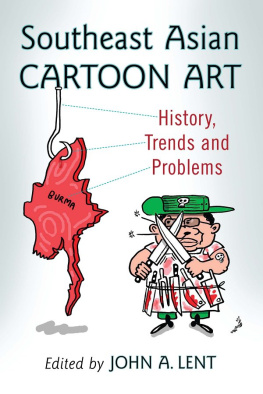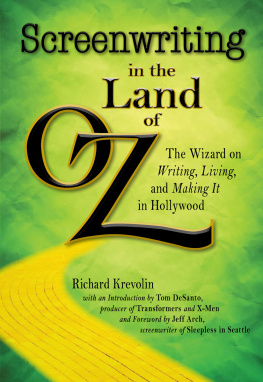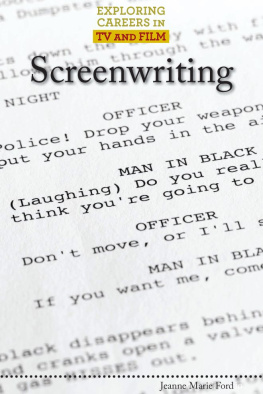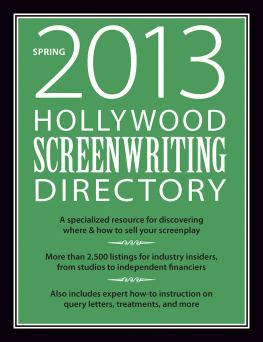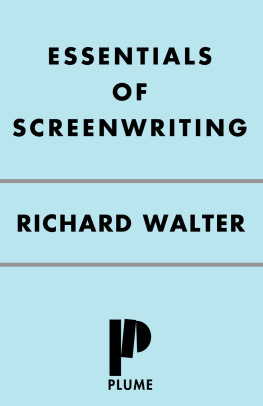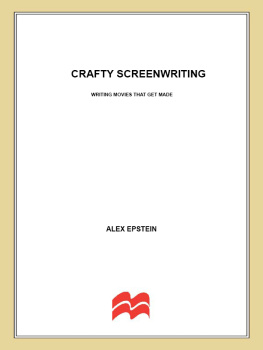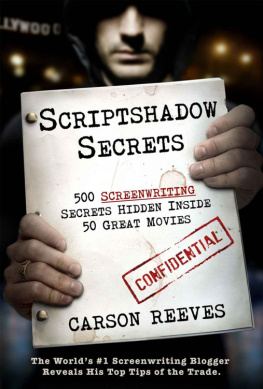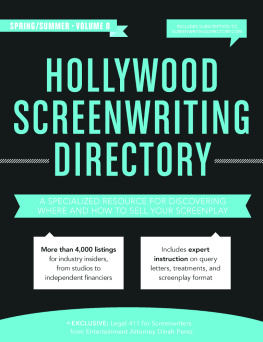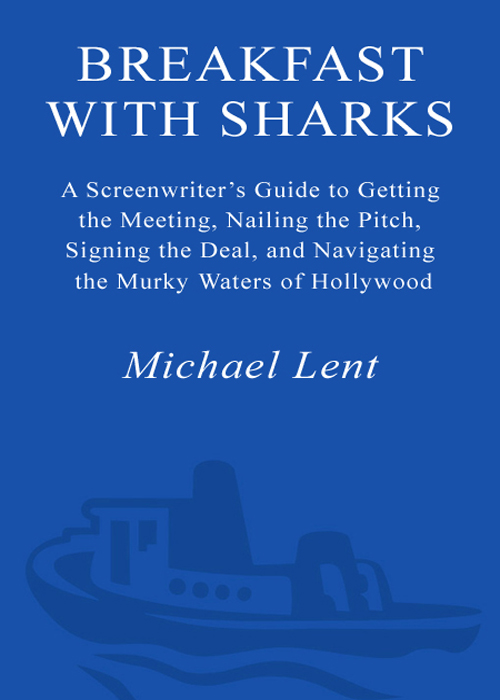
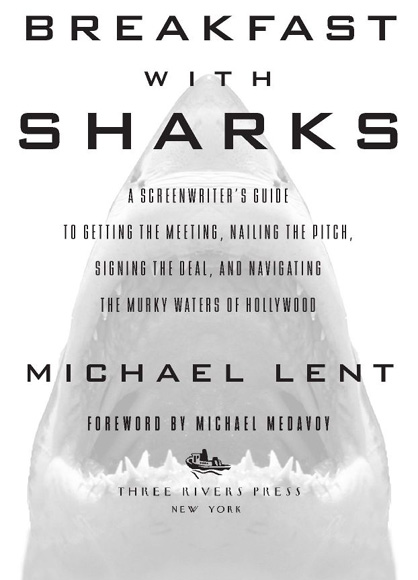
Table of Contents
TO MY WIFE, SONIA.
YOU ARE THE BE-ALL, END-ALL,
LOVE OF MY LIFE AND LIVING PROOF THAT
BESIDE EVERY GOOD MAN IS A GREAT WOMAN.
AND TO OUR BEAUTIFUL NEW SON
WILLEM SPENCER
ACKNOWLEDGMENTS
Carrie Thornton, my editor.
I am truly fortunate to work with an excellent editor like Carrie. Thank you and the terrific Three Rivers Press team for all your hard work on behalf of this book.
Erik Bauer, my long-suffering editor at Creative Screenwriting magazine.
In addition to being the most even-keeled publisher I have ever met, you are a good friend.
Daniel Greenberg, my agent.
Thank you for making this project happen.
Mary Lent and Walt Heinbach, my grandparents.
Both had an extraordinary work ethic and truly believed in the power of knowledge.
Inez Bauer, my copy editor at Creative Screenwriting magazine. Thank you for your help proofing and correcting this manuscript.
Masako Oshiro Beckwith, my mother-in-law.
You have taught me the true meaning of perseverance and determination against all odds.
Domo arigato.
Janet and Joseph Hirschoff.
Thank you for being the sister and brother who encouraged me day in and day out.
Paul Lazarus III.
Thank you for sharing your experiences, which inspired me.
Norma Brokaw
Thank you for your words of encouragement when I needed them most
Playwright David Rambo
Theodore Heyck, Esq.
Dr. Valarie Clemente-Crain
Lee Hamilton Knight
Dr. Nitin Patel
Thank you for your friendship, wisdom, and encouragement throughout my journey in Hollywood.
FOREWORD
Navigating the depths of the Hollywood shoal is as difficult as venturing into a Minoan cave without a ball of string, especially if you werent born into a place of wealth or position. My own start in this industry was in some way the norm. I started at the bottom, like most people who gain entry into the business of moviemaking by delivering mail or as readers at a studio. However, to succeed here, you will needamong other thingshelp and guidance. Breakfastwith Sharks will provide that help and guidance, but nothing beats jumping in headfirst and starting your career yourself.
This business, more than any other industry, is constantly changing; tastes change and people in power change positions frequently. Many who come to Hollywood and make a go of it are driven out by the undertow and the vicissitudes of time. The sine qua non is the passion for their craft, lots of patience, and the ability to stay at the table long enough to get people to notice you. You have to know that a career in Hollywood is a marathon and not the hundred-yard dash.
Millions of people are trying to open doors in the movie business, but only a few will make a living at it. Luck and, most of all, talent are the most important ingredients. Experience comes after that. The thing to remember most is to find a friendly ally quickly. Also, think about what is important to you. In my opinion this isnt money. That will come if you love what you do. You have to keep your priorities in order. In my view, family and a few friends come first. These values and what you do for others will determine your character and will put you in good stead. Be honest, first to yourself, then to others. If you take the easy way in, you will suffer the easy way out.
That said, read Breakfast with Sharks, learn, and then go ahead with it and enjoy the journey.
Mike Medavoy, Chairman of Phoenix Pictures
INTRODUCTION
Hollywood is one place in the world where you can die ofencouragement.
DOROTHY PARKER
Graduate film school was the best two and a half years of my life. The next three years that followed were definitely not. Since way back, I had focused on this singleminded dream of writing movies for a living. All was going according to my master plan until just after my relocation to Hollywood in the autumn of 1993. Upon arrival, I hit the ground running with three completed specs and three student films made for under $1,000 each. Luckier and maybe more persistent than most, I quickly landed my first production company writing assignment, along with a high-profile agent at one of the Big Five literary agencies (those being CAA, ICM, WMA, UTA, and Endeavor) in Los Angeles. A studio executive at Disney was also championing my spec script. Life was sweet. Indeed, my Barcalounger was oiled and ready for a victory lap down Sunset Boulevard. But wait... within my first forty-five days, the assignment project was dead, the executive was fired, and my agent let me go with a blunt 7:30 a.m. phone call saying, I shopped your spec, but couldnt find a buyer. I read your new spec. Its okay, but frankly I was unimpressed. You had one friend in this town [the aforementioned exec] and now you dont. I dont think theres any more I can do for you. My first thoughts were Who conducts business at thatungodly hour? and Now what the hell do I do? While the questions came quickly, the answers took years. In the difficult days and weeks that followed, it would hit me like a brick hurled from hell that although I had watched both Eraserhead and The Seventh Seal frame by frame seventeen times, and understood as much about binary character theory and restorative three-act structure as anyone else, I was still desperately unprepared for this brave new world of trial and many, many errors. Unfortunately, writing a script, or making a short film, or taking a dozen film theory courses in no way prepares you for what Hollywood is really like.
Aside from my fellow film-school plebes who were scrambling and being cut from the sled dog races just like me, my now ex-agent was right, I was out here alone in the harsh wilderness of botox injections and Chuckie VII. I soon discovered that broken deals and fickle fortune were part of the initiation process for a place where ex-lawyers sort mail at talent agencies while hoping soon to land as agent trainees. In the ensuing months I realized that my formative academic background meant very little in Tinseltown. I was qualified for a place at the starting gate, but not guaranteed a career. The day you finish law school and pass the bar exam, someone will hire you to practice law, but that is not the case with film school. In fact, I had little practical experience or even a reference point to cope with the business and day-to-day aspects of life here. Meanwhile, a tsunami of student loan debt$60,000 to be exactthreatened to wash away my flimsy thatched hut of patience and self-confidence.
I remember once talking to an aspiring director who had been out here for three years. She said, Im struggling so much here I cant bring myself to tell people I have a masters. After listening to her plight, I promised myself that no matter what, I wasnt going to be back on the bus, another casualty on Hollywoods Walk of Shame. What actions I took next would determine whether or not I was to have a career in film. So I scoured the bookstores for material pertaining to my situation. I was a writer who could write but who didnt have a clue how to navigate the hierarchy of Hollywoodon the bookshelves I found little that pertained to my situation. Unfortunately, to this day, few sources exist for those looking to go beyond how to shoot a movie, how to write a script, how to find an agent. Actually learning how to be a full-time screenwriter, how to make the leap from competence in the art to the business side of the craft, would have to come the hard-knocks way. There was no guidebook to be found. That process for me took more than four years with cumulative writer earnings of $6,500. By then, all but a few from my graduate and undergraduate film-school classes were long gone, back on that bus.
Next page

